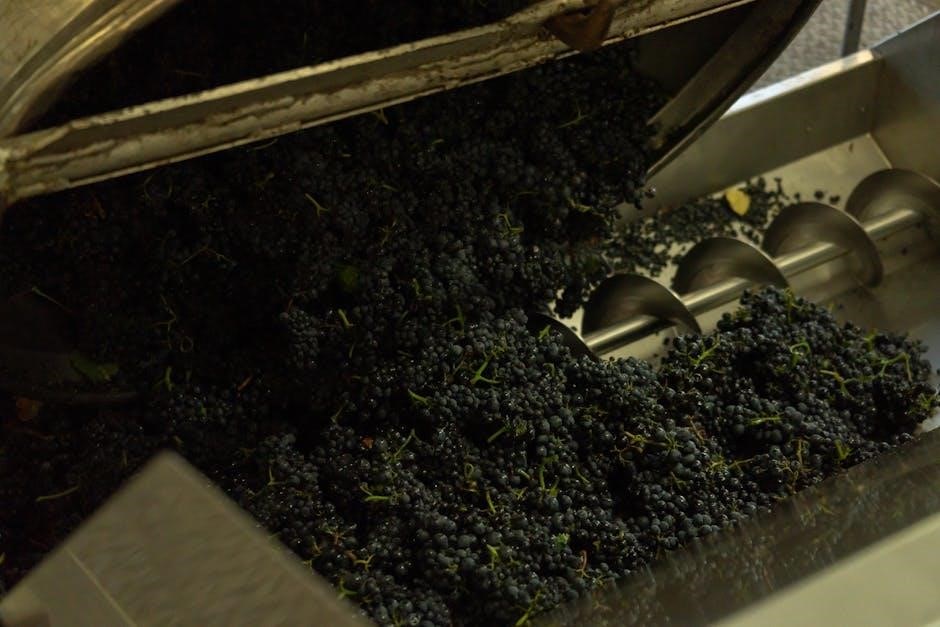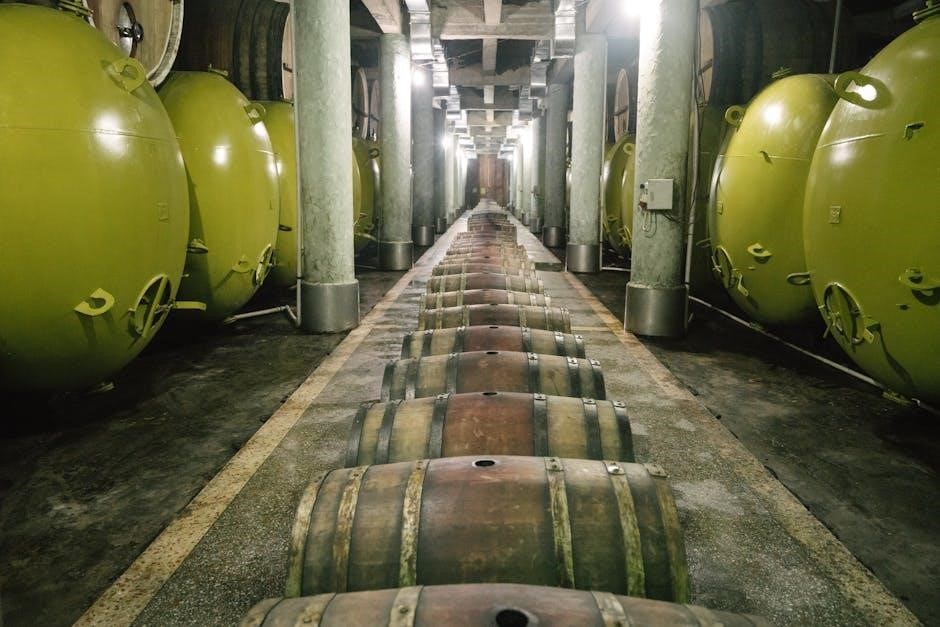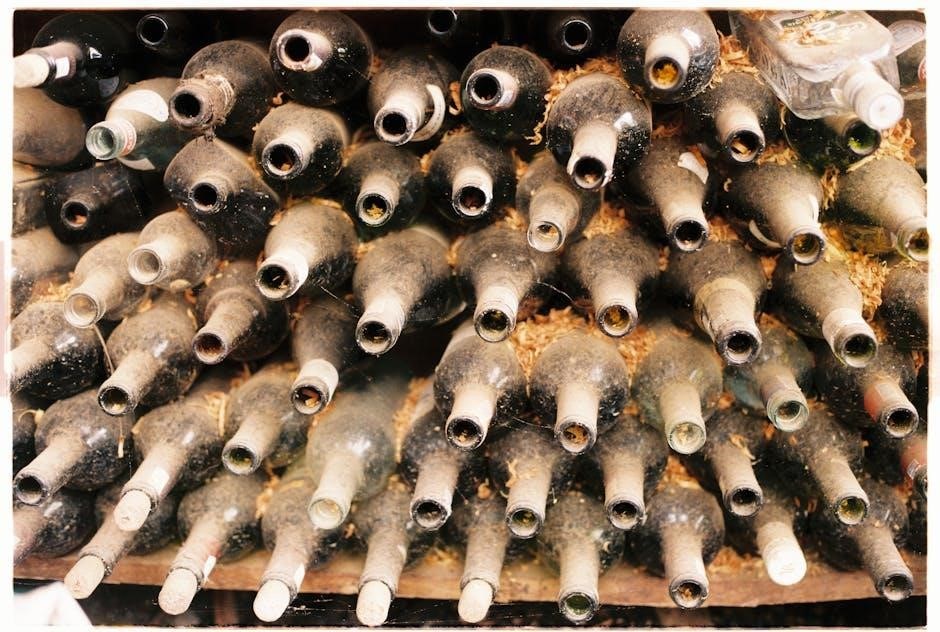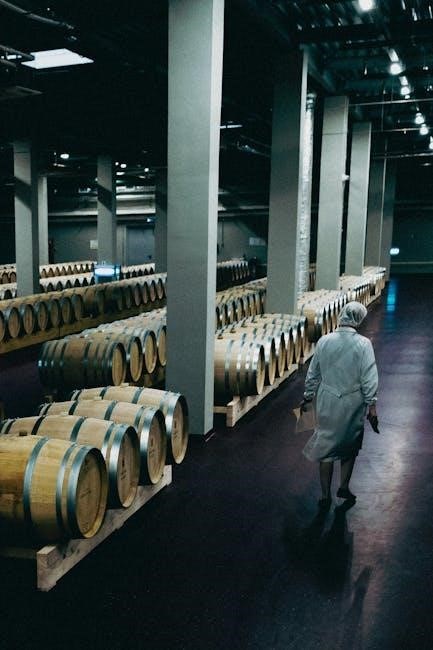The Wine Industry Award Pay Guide outlines pay rates, allowances, and working conditions for employees in the wine industry, ensuring compliance with modern awards and regulations.
Overview of the Wine Industry Award
The Wine Industry Award is a modern award that regulates pay rates, allowances, and working conditions for employees in the wine industry. It covers employers and employees engaged in activities such as vineyard work, winemaking, and related roles. The award ensures fair compensation and compliance with workplace laws, including minimum wages, overtime, and leave entitlements. It also outlines specific provisions for casual and shift work, junior rates, and industry-specific allowances. Employers must adhere to the award’s clauses to avoid penalties for non-compliance. The Wine Industry Award is regularly updated to reflect changes in workplace regulations and industry needs, ensuring it remains relevant and effective for both employers and employees.
Importance of Understanding Pay Rates in the Wine Industry
Understanding pay rates in the wine industry is crucial for both employers and employees to ensure compliance with legal requirements and maintain fair workplace practices. Accurate knowledge of the Wine Industry Award helps employers avoid penalties for non-compliance while enabling employees to verify their entitlements; Pay rates vary based on roles, such as vineyard work, winemaking, and administrative tasks, and include provisions for casual, shift, and junior workers. Staying informed about updates to the award ensures that all parties adapt to changes in minimum wages, allowances, and working conditions. This knowledge fosters transparency, trust, and a productive work environment, essential for the industry’s growth and sustainability.
Regulations and Compliance
Regulations under the Wine Industry Award ensure fair pay and safe working conditions, with penalties for non-compliance. Employers must adhere to Modern Awards and Fair Work Act requirements.
Modern Awards and Their Impact on the Wine Industry
Modern Awards, such as the Wine Industry Award 2020, provide a framework for fair pay and conditions in the wine sector. These awards ensure employers comply with minimum wage rates, overtime, and allowances, promoting transparency and equity. By standardizing pay structures, they help prevent underpayment and protect workers’ rights; Employers must stay informed about updates to these awards to avoid penalties. The awards also adapt to industry changes, such as market trends and seasonal demands, ensuring they remain relevant and effective in supporting both employers and employees in the wine industry.
Key Clauses of the Wine Industry Award
The Wine Industry Award 2020 includes key clauses that outline specific conditions for employees. Clause 23.6 details piecework agreements, specifying which award clauses do not apply to such arrangements. This ensures transparency and fairness for vineyard workers engaged in piecework. Other clauses address allowances, overtime rates, and standard working hours, providing a clear framework for employers to follow. The award also covers leave entitlements and shift work conditions, ensuring employees receive appropriate compensation for varying work arrangements. These clauses are essential for maintaining compliance and fostering a fair work environment within the wine industry.
Compliance Requirements for Employers
Employers in the wine industry must adhere to the Wine Industry Award 2020 to ensure compliance with legal requirements. This includes maintaining accurate records of pay rates, working hours, and leave entitlements. Employers are also required to provide employees with payslips and ensure all payments align with the prescribed rates. Understanding and applying modern award conditions, such as piecework agreements outlined in Clause 23.6, is crucial. Employers must stay informed about updates to the award and adjust their practices accordingly. Failure to comply can result in penalties, emphasizing the importance of regular audits and staff training. By adhering to these requirements, employers foster a fair and lawful work environment.

Pay Rates and Structures
The Wine Industry Award sets clear pay rates for adult, junior, and casual workers, including piecework agreements and shift loadings, ensuring fair compensation across the industry.

Adult Rates for Vineyard Work
The Wine Industry Award specifies detailed pay rates for adult employees engaged in vineyard work, including both casual and permanent staff. Casual workers receive a higher rate to account for benefits like annual leave and public holidays. Permanent employees are entitled to base rates, with adjustments for experience and qualifications. The award outlines minimum hourly rates, ensuring fair compensation for tasks such as pruning, harvesting, and vine maintenance. Additional payments may apply for shift work, overtime, or piecework agreements. Employers must adhere to these rates to maintain compliance, ensuring transparency and equity in vineyard operations. These rates are regularly updated to reflect industry standards and economic conditions, providing a clear framework for both employers and employees.
Junior Rates and Conditions
The Wine Industry Award provides specific pay rates and conditions for junior employees, ensuring fair compensation based on age and experience. Juniors, typically aged between 13 and 20, are entitled to a percentage of the adult rate, increasing with age. For example, a 16-year-old may receive 60% of the adult rate, while an 18-year-old receives 80%. These rates apply to both casual and permanent junior employees. The award also outlines restrictions on working hours for juniors to protect their education and well-being. Employers must adhere to these provisions to ensure compliance with labor laws. These measures aim to balance fair pay with the need to protect young workers in the wine industry. Regular updates ensure rates align with industry standards and economic conditions.

Casual and Shift Work Rates
Casual employees in the wine industry are entitled to higher rates than permanent workers, reflecting the nature of their employment. The Wine Industry Award specifies that casuals receive a 25% loading on their base rate, applied to all hours worked. Shift work rates vary depending on the timing, with penalties for evening, night, or weekend shifts. For example, evening shifts may attract a 15% penalty, while night shifts incur a 20% penalty. Weekend rates are typically higher, with Saturdays drawing a 10% penalty and Sundays a 20% penalty. These provisions ensure fair compensation for the flexibility and irregularity often required in casual and shift-based roles within the industry. Employers must adhere to these rates to maintain compliance with the award. Regular updates ensure these rates remain relevant and fair. Overtime rates apply when casual or shift workers exceed standard hours, often at 150% for the first two hours and 200% thereafter. These measures aim to balance worker needs with industry demands, ensuring equitable pay for all employees. The award’s structure ensures transparency and fairness in compensating casual and shift workers. Employers are encouraged to use the Pay and Conditions Tool to verify correct rates and avoid penalties. Proper adherence to these guidelines fosters a positive work environment and maintains legal compliance. The Wine Industry Award thus provides a clear framework for casual and shift work rates, ensuring all employees are fairly compensated. Understanding these rates is essential for both employers and employees to navigate the industry effectively. By following the guidelines, employers can avoid disputes and ensure a motivated workforce. The award’s provisions are designed to adapt to industry changes, ensuring long-term sustainability and fairness. As the wine industry evolves, these rates and conditions remain a cornerstone of employment practices. Employers should regularly review and update their payment structures to align with the latest award adjustments. This proactive approach helps maintain trust and compliance within the workplace. Overall, the Wine Industry Award offers a comprehensive system for compensating casual and shift workers, ensuring fairness and transparency in all employment arrangements. By adhering to these guidelines, employers can foster a positive and productive work environment. The award’s emphasis on fair compensation reflects the importance of valuing all employees, regardless of their employment type. This balanced approach supports the growth and success of the wine industry as a whole.

Allowances and Penalties
Allowances and penalties under the Wine Industry Award ensure fair compensation for specific work conditions and hours. Penalties apply for evening, night, or weekend shifts, reflecting the nature of wine industry work.
Definition and Operation of Allowances
Allowances under the Wine Industry Award are additional payments for specific work conditions, such as handling hazardous materials or working in challenging environments. These payments compensate employees for extra duties or inconveniences. The operation of allowances is clearly defined in the award, ensuring transparency and fairness. Employers must adhere to these guidelines when calculating and providing allowances to their workers. Allowances are typically included in the employee’s regular pay and are subject to compliance checks to ensure they meet legal requirements. This ensures that employees receive appropriate compensation for their work-related circumstances, maintaining equity and adherence to industry standards.
Penalties for Non-Compliance
Employers who fail to comply with the Wine Industry Award may face penalties, including fines and legal action. Non-compliance can result from underpayment of wages, incorrect allowances, or breach of working conditions. The Fair Work Ombudsman enforces these penalties, ensuring employers adhere to the award’s requirements. Repeat offenses can lead to higher fines and damage to the employer’s reputation. It is crucial for employers to understand and follow the award’s guidelines to avoid these consequences. Penalties serve as a deterrent, promoting fair workplace practices and protecting employee rights. Compliance is essential to maintain a lawful and equitable work environment in the wine industry.
Overtime and Special Payments
Overtime and special payments are detailed in the Wine Industry Award to ensure fair compensation for employees working beyond standard hours or under specific conditions. Overtime rates apply when employees work more than 38 hours per week, with rates set at 1.5 times the standard rate for the first two hours and double time thereafter. Special payments may include allowances for tasks like handling chemicals or working in hazardous conditions. These provisions aim to compensate employees for additional efforts and ensure employers adhere to legal requirements. Understanding these payments is crucial for maintaining compliance and fairness in the workplace, as non-compliance can lead to penalties. Regular updates to the award ensure these payments reflect current industry standards and employee needs.
Working Hours and Leave Entitlements
The Wine Industry Award regulates working hours and leave entitlements, ensuring employees receive fair compensation for standard hours, overtime, and approved leave, promoting work-life balance and compliance.
Standard Working Hours in the Wine Industry
Standard working hours in the wine industry are typically 38 hours per week, divided into shifts that may vary based on operational needs. Employees are entitled to regular breaks, including meal intervals, ensuring a balance between productivity and rest. Seasonal fluctuations often influence working patterns, with peak periods requiring longer hours during harvest. Employers must adhere to the Wine Industry Award’s provisions regarding maximum daily and weekly hours, as well as mandatory rest periods between shifts. Compliance with these standards ensures fair treatment of workers and maintains industry efficiency. Proper scheduling and time management are crucial to meet these requirements effectively.
Leave Arrangements and Entitlements
Leave arrangements under the Wine Industry Award ensure employees receive entitlements such as annual leave, sick leave, and long service leave. Annual leave is typically four weeks per year, accrued over a 12-month period. Sick leave allows for 10 days per year, supporting employees during health-related absences. Long service leave is granted after a decade of continuous service, providing an additional period of rest. These provisions aim to balance work demands with personal well-being. Employers must accurately track and manage leave entitlements to comply with the Award’s requirements, ensuring fairness and transparency for all staff members in the wine industry.

Industry-Specific Considerations
The wine industry’s seasonal nature influences pay structures, with variations in workload and demand impacting rates. Market trends also shape pricing and production costs, affecting employee compensation.
Seasonal Variations in Pay and Workload
The wine industry experiences significant seasonal fluctuations, with workload and pay varying depending on the time of year; Peak periods, such as harvest seasons, often require increased labor, leading to higher demand for vineyard workers. Employers may adjust pay rates or offer overtime to manage workload surges. Additionally, piecework agreements, as outlined in the Wine Industry Award, allow for flexible compensation based on productivity during busy periods. These variations ensure that employees are fairly compensated for their efforts, while employers maintain operational efficiency. Understanding these seasonal pay adjustments is crucial for both employees and employers to navigate the industry’s cyclical nature effectively.
Impact of Market Trends on Pay Rates
Market trends significantly influence pay rates in the wine industry, as consumer preferences and economic conditions shape demand. For instance, shifts toward premium wines or sustainability practices may increase wages for skilled workers. Additionally, global market fluctuations, such as changes in export demand, can affect production volumes and, consequently, employee compensation. Employers often adjust pay structures to align with industry growth or challenges, ensuring competitiveness. Understanding these market-driven dynamics is essential for both employees and employers to adapt to changing financial landscapes and maintain fair compensation practices. Staying informed about industry trends helps navigate pay rate adjustments effectively.
Resources and Tools
Various resources and tools are available to help navigate the Wine Industry Award Pay Guide, including the Fair Work Ombudsman’s Pay and Conditions Tool and employer guides.
- Pay and Conditions Tool for precise rate calculations.
- Comprehensive guides for employers to ensure compliance.
- Online resources for understanding allowances and penalties.
Pay and Conditions Tool for Employees
The Fair Work Ombudsman provides the Pay and Conditions Tool, enabling employees to calculate their correct pay rates under the Wine Industry Award.
- It offers detailed information on hourly rates, allowances, and penalties.
- Employees can input their role and hours to determine entitlements.
- The tool also covers leave arrangements and shift work conditions.
- Regular updates ensure compliance with the latest award changes.
This resource is essential for employees to verify their pay and understand their rights.
Guides and Tools for Employers
Employers in the wine industry can access tailored resources to ensure compliance with the Wine Industry Award.
- The Fair Work Ombudsman offers detailed guides on pay rates and conditions.
- Employer-specific tools help calculate correct wages and allowances.
- Compliance checklists ensure adherence to modern award requirements.
- Industry-specific calculators assist with overtime and penalty rate calculations.
- Guides also cover managing leave entitlements and shift work arrangements.
These tools empower employers to maintain compliance and foster fair workplace practices.

Recent Updates and Changes
The Wine Industry Award has seen updates in 2023, including changes to minimum wages and piecework agreements, as outlined in clause 23.6, effective from February 2025.
2023 Updates to the Wine Industry Award
The 2023 updates to the Wine Industry Award introduced changes to minimum wages, piecework agreements, and compliance requirements. Clause 23;6 now outlines specific piecework provisions, ensuring fair compensation for vineyard workers. These updates aim to align pay rates with industry standards and address emerging trends in the market. Employers are required to adhere to new guidelines, which include detailed records of work hours and payments. The changes also reflect the impact of market fluctuations on wineries, particularly the shift in consumer preferences and production challenges. Staying informed about these updates is crucial for both employers and employees to maintain compliance and fair labor practices in the wine industry.
Future Trends in Wine Industry Pay Rates
Future trends in wine industry pay rates are expected to be influenced by market demands and evolving consumer preferences. As the industry adapts to changing trends, such as a shift toward premium and sustainable products, pay structures may reflect these priorities. Technological advancements in vineyard management and winemaking could also impact wage growth, particularly for specialized roles. Additionally, the industry may see increased focus on fair labor practices and transparency in compensation, driven by consumer awareness and regulatory pressures. Employers will need to stay ahead of these trends to attract and retain skilled workers, ensuring competitiveness in a dynamic global market.
The Wine Industry Award Pay Guide is essential for understanding pay rates and compliance, ensuring fair compensation and adherence to regulations in the wine industry.
The Wine Industry Award Pay Guide provides comprehensive details on pay rates, allowances, and working conditions for employees in the wine industry. It ensures compliance with modern awards and regulations, outlining minimum wages, casual and shift work rates, and junior rates. The guide also covers allowances, penalties, and overtime payments, ensuring fair compensation for all workers. Employers must adhere to specific clauses, such as piecework agreements and compliance requirements, to avoid penalties. The guide is structured to cover full-time, part-time, and casual workers, providing clarity on working hours, leave entitlements, and industry-specific considerations like seasonal variations. Utilizing resources like the Pay and Conditions Tool can help employees and employers stay informed and ensure adherence to the award’s provisions.
Importance of Staying Informed
Staying informed about the Wine Industry Award Pay Guide is crucial for both employers and employees to ensure compliance and fair compensation. Regular updates, such as the 2023 amendments, can significantly impact pay rates and working conditions. Employers who remain updated can avoid penalties for non-compliance, while employees can ensure they receive correct entitlements; The guide provides resources like the Pay and Conditions Tool, which simplifies understanding of allowances, penalties, and overtime. As the wine industry evolves, staying informed helps adapt to market trends and seasonal variations. Proactive engagement with the guide ensures transparency and fairness in workplace relations, fostering a positive and productive work environment. Regular reviews and updates are essential for all stakeholders.
